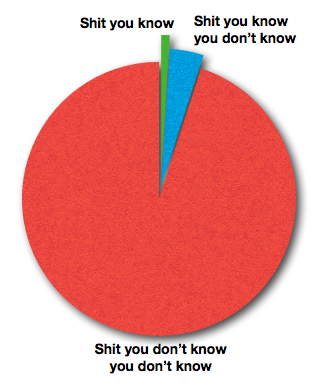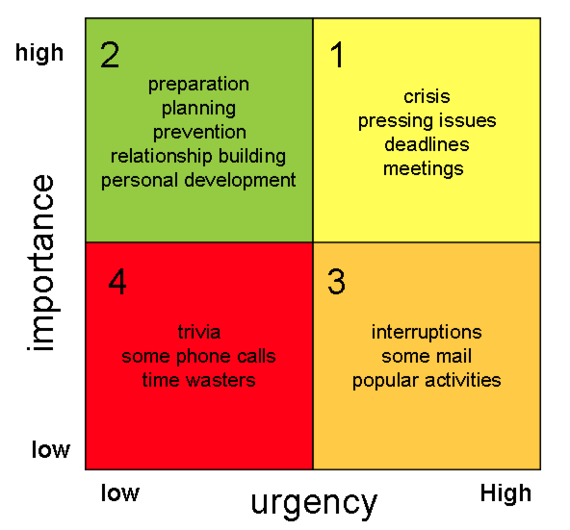Failing sucks. But it happens to all of us.
A few months ago, I made the decision to step away from my business.
The business that I dropped out of school for didn't take off as the media outlets convinced me it would. Not only did it leave me with an unsuccessful business, it left me unemployed, broke and alone in a new city.
Sounds terrible? It shouldn't. It may have been one of the lowest points in my life, but it was also the most thought-provoking.
I've learned more in my four months of transitioning than in my four years in college. Lessons that can only be learned in the front-lines of battle, not in the lecture hall. Lessons that will save years of hardship and sacrifice in the future, when the stakes are higher than my Kraft Dinner diet.
Here are 10 lessons I learned from failing:
1. Failing is overrated.
There's a cultural fascination with the concept of failure. When you fail, you've learned a sequence of things that didn't work, but you still don't know what will work. You won't make the same mistakes again, but you could just as well make a different mistake next time. If you're going to reflect on your failures, focus on improving what has succeeded in the past rather than avoiding what has failed.
2. Own up to your failures.
If you set out to do something, but fail to do so -- own up to your shit. Most people can empathize because everyone knows what it's like to make mistakes. People will respect you for owning up to everything. It shows that you have nothing to hide.
Embrace your failures.
3. The world will never change unless you change.
The world's not going to change for any of us. We can't blame the shortfalls in our lives on the people around us. The outside world is just a reflection of who we are inside. How you react to the events in your life will be the biggest determinant of who you are.
If you want the world to change, change yourself first.
4. Pursue what you love.
Don't become the rabbit chasing the carrot. You'll be chasing your whole life. Instead, find a passion you could pursue for the rest of your life. Craft your mastery and become better than anyone at it. Not only will money follow, success will.
As Steve Jobs once said, "If you don't love it, you'll fail."
5. Presence will always beat presents.
If you're absent during my struggle, don't expect to be present during my success.
-- Will Smith
6. No one knows what they're doing.
Here's the truth. None of us actually knows what we're doing.
Yes -- even Fortune 500 CEO's and successful entrepreneurs.
We're all just winging it. The difference is that experienced people have learned to mitigate mistakes better than others.
There will be times when those around us provide recognition for a topic we have limited knowledge about. It's okay, as long as you're self-aware of the shit you don't know you don't know. The people you want to be cautious of are the people that take pride on the shit they know. The sooner you realize that everyone around you also has no idea what they're doing, the sooner you'll let go of your fear and take the leap.
7. Treasure your time.
Time is the most precious commodity we have. We need to protect it.
My mentor once advised that the most effective way to manage time was to treat it as if we're a Fortune 500 CEO. There's a significant difference in how you shift your priorities when your time is worth $2,000/hr vs. $20/hr.
I've been using the Eisenhower Matrix to plan my time.
Here's a plan of action for each quadrant:
1. Urgent and Important: Do it immediately.
2. Non-Urgent and Important: Decide when you'll do it.
3. Urgent and Non-Important: Delegate to someone else.
4. Non-Urgent and Non-Important: Do it later.
Stephen Covey, author of "Seven Habits of Highly Effective People" suggests that we should be focusing our time on Quadrant 2, as it provides lasting happiness, fulfillment, and success.
8. Push yourself harder.
Too often we underestimate our abilities. This is why we rely on motivational articles or videos to push us. Become independent from external factors of motivation, and learn to push yourself internally.
The truth is, you can push yourself harder than you think.
You have a bigger influence in people than you think. Don't ever underestimate your abilities -- you have a lot to share with the world.
9. Always speak your mind.
Running my business, I've reserved my comments thinking it will hurt the person's feelings or assumed we were on the same page. What a mistake this was. Not only did we waste time, but we endangered each other's trust by not communicating our thoughts. "Here's what I think." will always beat "I should have said..."
Speak your mind even if it's not what the other person wants to hear.
10. Enjoy the ride.
Cherish where you've been.
Preserve what you have.
Embrace who you'll be.
Failure is part of the process, so don't be afraid to get lost once in a while.
Sometimes you have to lose yourself to find yourself.
____
If you found this article helpful, please share it with your loved ones.
Come start a conversation with Sean on Facebook and Twitter.
Check out The Growth List for more articles like this.


